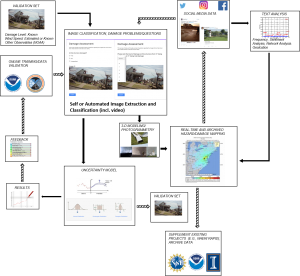Quantifying Uncertainty in Crowd Response for Reliable Wind Hazard and Damage Assessment

Damage to infrastructure arising from windstorms exceeds damage from any other natural hazard in the U.S. The highly variable nature of wind loadings on buildings during a windstorm, however, means that accurate characterization at the damage location may not be captured by current measurement networks. Ubiquitous smartphone and internet availability, widespread use and rapid dissemination of social media, the power of crowds engaged in scientific endeavors, and the public’s awareness of vulnerabilities point to a paradigm shift in sensing hazards in general. In the case of windstorm damage, on-the-ground data retrieved and shared by Citizen Science public participation may provide windstorm data previously unavailable.
The primary focus of this EArly-concept Grant for Exploratory Research (EAGER) award is to study “human-sensor” data collected through Amazon Mechanical Turk– a crowd sourcing application. Volunteers will be shown images and related data from actual windstorms and asked to characterize the damage and their confidence in their assessments. These data will be used to design a crowd sourcing algorithm that will enable robust Citizen Science public participation in the rapid identification of damage areas to help decision makers to allocate resources for damage response and recovery efforts and for targeted damage assessments, which can help to improve the design of buildings in regions susceptible to intense windstorms. This research will be done in collaboration with Prof. Hadi Meidani.
